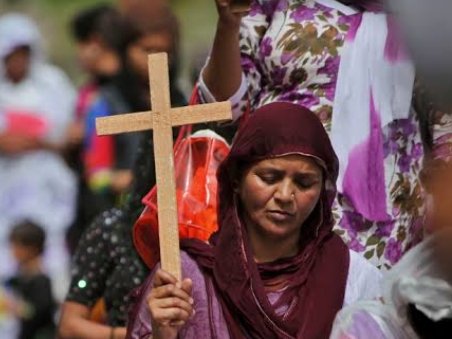The right to propagate religion cannot lead to undermining of faiths.


Writer – Balbir Punj
Even as the vexed issue of religious conversions is being heard in the Supreme Court (SC), it continues to roil the country. On January 2, a church was vandalised, and six police personnel, including a senior police officer, were injured in Narayanpur district in Chhattisgarh, during a protest by a group of tribespeople against an alleged incident of religious conversion.
But this was not a sudden development. In July 2021, Sunil Sharma, the superintendent of police in neighbouring Sukma district, flagged the possibility of a conflict. “Christian missionaries and converted tribes are reaching the interiors of the district and are luring local tribals. We cannot deny the possibility of conflict between converted tribals and locals,” he wrote in a report.
Who threw the first stone or provoked violence at Narayanpur is for the police to investigate and the courts to decide. But the circumstances leading to this ugly situation are all too familiar. The tribals or janjati have a unique lifestyle, distinct culture, and indigenous modes of worship shaped by their engagement with nature. Fired by exclusivist dogma, some missionaries are committed to bringing all non-believers into their religion’s fold.
In 2018, John Allen Chau, 27, an American evangelical, was killed by members of a remote tribe in the Andaman Islands when he made a third attempt to reach and convert them. The tribe — Sentinelese — is protected by law and lives in voluntary isolation. Chau knew his actions were illegal and entailed danger to his life. But his religious zeal overshadowed his safety, respect for the law, and the right of the tribespeople to live by their beliefs. He considered their habitat “Satan’s stranglehold” and wrote in his diary, “I think it’s worthwhile to declare Jesus to these people.”
Such intrusive activities, reeking of a mediaeval mindset, are out of sync with the modern value system, which recognises an individual’s right to decide what to eat, wear and believe, or not believe, in. Proselytisation implies demeaning another person’s faith. It assumes non-Christian religions are inadequate. Can a civilised society allow an organised group to question other people’s choice of faith and use allurements, fraud or fear? Evangelisation amounts to the colonisation of the spirituality space.
Faced with this onslaught, some targeted groups now resent intrusive outside influence. This is what Mahatma Gandhi had warned. In a letter to the Christians of Kerala (Harijan, January 30, 1937), Gandhi-ji asked: “Why should a Christian want to convert a Hindu to Christianity and vice versa? … insistence on a particular form or repetition of a credo may be a potent cause of violent quarrels leading to bloodshed and ending in utter disbelief in religion, i.e., God himself.” How prophetic.
Aggressive evangelisation has led to bloodshed at times. Swami Lakshmanananda Saraswati and four disciples were murdered on August 23, 2008, in Kandhamal, Odisha. Saraswati, a Hindu monk, worked for the welfare of tribals and opposed missionary activities in the area. The uproar caused by the killing later sparked riots in the area. In another despicable incident, Graham Stuart Staines, an Australian missionary and his two sons were burnt to death in 1999 by Bajrang Dal activists, led by Dara Singh.
In 1954, the then Congress-ruled Madhya Pradesh appointed the M Bhawani Shankar Niyogi Committee to examine missionary activities in the state. Its report, published in 1956, says Roman Catholic missions used money lending for proselytisation. They gave loans that were later written off if the debtor became a Christian.
Because of social tensions, nine states have passed anti-conversion laws. Various groups have challenged these laws in the courts. On January 16, 2022, the SC advised the petitioners to compile all petitions and move a consolidated transfer petition so that the cases could be transferred to it.
Article 25 of the Constitution guarantees the freedom to profess, practice and propagate religion to all citizens, subject to public order, health and morality. Can the right to propagate religion undermine other faiths and disturb social balance? Can the State allow activities that generate social tensions and transgress the limits of morality?
We will have to wait for the top court’s verdict to know the answers.
Balbir Punj is a former member of Parliament.
DISCLAIMER: The author is solely responsible for the views expressed in this article. The author carries the responsibility for citing and/or licensing of images utilized within the text.
